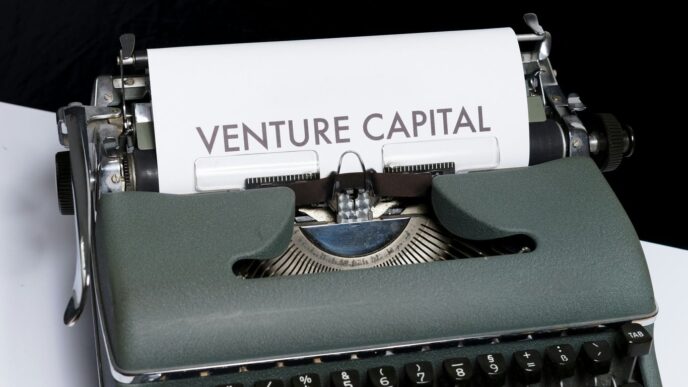Ever thought about starting your own business but felt a bit lost on how to begin? Many people have those same ideas buzzing around. This article is about Techstars Startup Weekend, a program that helps people learn the ropes of entrepreneurship. It’s a place to get hands-on experience and figure out if running a startup is for you. We’ll look at what makes Techstars Startup Weekend different and how it can help you move forward.
Key Takeaways
- Get a real feel for what it’s like to build a startup in just 54 hours.
- Learn directly from people who have successfully started and grown businesses.
- Understand how to take an idea from concept to a potential business model.
- Practice skills like teamwork, problem-solving, and presenting your ideas.
- Connect with other aspiring entrepreneurs and mentors who can offer support.
Experience the Techstars Startup Weekend Difference
So, what makes Techstars Startup Weekend stand out from other events? It’s really about getting a genuine feel for what it’s like to build a company from scratch, all packed into a single, intense weekend. You’re not just listening to talks; you’re actively doing.
Creating a Real Startup Experience in 54 Hours
Forget theory for a moment. Startup Weekend throws you right into the deep end. You’ll form teams, brainstorm ideas, and then, the real work begins: turning that idea into something tangible. This means figuring out if people actually want what you’re making, building a basic version of it, and planning how to sell it. It’s a compressed version of the startup rollercoaster, giving you a taste of the highs and lows you’d face in the real world. You’ll learn to make quick decisions and adapt on the fly, which is pretty much the daily grind for any founder.
Key Takeaways and Benefits of Participating
People leave Startup Weekend with more than just a certificate. You get practical skills you can use right away. Think about learning how to talk to potential customers to see if your idea is a good one, or how to sketch out a business plan that actually makes sense. Plus, you get to meet a lot of different people – potential co-founders, mentors, and even future investors. It’s a chance to see if this whole entrepreneur thing is really for you.
Here’s a quick look at what you gain:
- Practical Skill Development: Learn customer validation, basic prototyping, and business model basics.
- Networking Opportunities: Connect with a diverse group of individuals, including mentors and peers.
- Real-World Simulation: Experience the pressures and pace of early-stage startup development.
Learn from Successful Entrepreneurs and Investors
One of the best parts is getting advice directly from people who have been there and done that. The mentors and judges are usually experienced entrepreneurs, venture capitalists, or industry experts. They’ve seen countless startups, both successful and not-so-successful. They’ll look at your idea, your prototype, and your pitch, and give you honest feedback. This isn’t just generic advice; it’s tailored to what you’re actually building. Their insights can be incredibly helpful in steering your project in the right direction.
Unlock Your Entrepreneurial Potential
Ever feel that spark, that idea that just won’t quit? Many people have those moments, but turning them into something real can feel like a huge hurdle. That’s where focused workshops come in. They’re not just about listening to lectures; they’re about getting your hands dirty and actually doing the work. Think of it as a crash course in making your business idea happen.
Why Workshops Are Important for Aspiring Entrepreneurs
Workshops provide a structured way to learn the ropes. You get to hear from people who’ve actually done it, and they share practical tips that you can use right away. It’s like getting a shortcut to avoid some of the common mistakes.
- Learn from Experience: Hear real stories and advice from seasoned entrepreneurs and investors.
- Practice Makes Progress: Engage in activities that simulate real business challenges.
- Build Your Network: Connect with other aspiring founders and potential collaborators.
Gain Practical Insights and Actionable Advice
Forget the theory; workshops focus on what works. You’ll learn how to:
- Figure out if your idea is something people actually want.
- Create a basic plan for how your business will make money.
- Talk about your idea in a way that gets people excited.
It’s about getting concrete steps you can take when you leave. You might even get to practice pitching your idea to experienced mentors, which is a big deal for building confidence.
Develop Essential Skills and Knowledge
Beyond just your specific idea, these events help you build a toolkit of skills. You’ll get better at problem-solving, working with a team, and adapting when things don’t go as planned. It’s a chance to see what you’re made of and grow in areas you might not have even considered before. This kind of hands-on learning is what really makes a difference when you’re starting out.
Empowering Female Entrepreneurs at Techstars Startup Weekend

Building a Supportive Network of Women in Business
Techstars Startup Weekend is a great place for women to connect with others who get it. Starting a business can feel pretty isolating sometimes, right? But here, you’re surrounded by other women who are also trying to get their ideas off the ground. It’s not just about sharing war stories, though that’s part of it. You can actually swap practical tips on things like finding suppliers or dealing with tricky customer service issues. This shared experience creates a bond that’s hard to find elsewhere. It’s like having a built-in support system that understands the unique hurdles women sometimes face in the business world.
Gaining Confidence and Essential Business Skills
Let’s be real, putting yourself out there with a new idea can be nerve-wracking. Startup Weekend is designed to help with that. You’ll get hands-on practice with things like pitching your idea, which can be a big confidence booster. Plus, you’ll pick up practical skills you might not have thought about, like how to quickly test if your business idea actually has legs. It’s not just theory; you’re doing it. You’ll learn how to:
- Develop a basic business model
- Create a simple prototype or presentation
- Talk about your idea clearly and concisely
Navigating Unique Challenges with Shared Experiences
Many women entrepreneurs face specific challenges, whether it’s securing funding or balancing work and family life. At Startup Weekend, you’ll hear from mentors who have been through it and connect with fellow participants who are dealing with similar situations. This isn’t about complaining; it’s about finding solutions together. You might learn a new approach to pitching that resonates better, or discover strategies for managing your time more effectively. Sharing these experiences helps normalize the difficulties and shows you that you’re not alone in figuring it all out.
Immersive Learning in the Startup Ecosystem
Techstars Startup Weekend isn’t just about listening; it’s about doing. You get thrown into the deep end of the startup world, which is exactly what you need to get a feel for it. Think of it as a crash course, but way more fun and with actual stakes.
Access to Renowned Faculty and Industry Experts
One of the coolest parts is getting to pick the brains of people who have actually done this before. We’re talking about founders who’ve built companies from scratch and investors who know what they’re looking for. They’ve been there, done that, and they’re willing to share what they learned. It’s not just theory; it’s real-world advice that you can actually use. You get to hear about their wins, their losses, and how they got through it all. It’s a chance to learn from the best, and honestly, that kind of insight is hard to find anywhere else. You can even check out what programs like Y Combinator Startup School offer in terms of expert advice.
Hands-On Activities and Real-World Case Studies
Forget dry lectures. Here, you’re building things. You’ll be working on actual business models, trying to figure out if your idea is something people will actually pay for, and maybe even putting together a basic prototype. They often use case studies that mirror what you might face, so you’re not just learning hypothetically. You’re applying concepts right away. It’s like a simulation, but it feels pretty real.
Networking with Like-Minded Individuals and Mentors
This event is a magnet for people who are passionate about building things. You’ll meet developers, designers, marketers, and other entrepreneurs. It’s a great place to find co-founders, collaborators, or just people who get what you’re trying to do. The mentors are there to guide you, offering feedback and pushing you to think harder about your idea. Building these connections is a big part of the experience, and you might just find your next business partner or a key advisor. It’s a chance to become part of the broader Techstars Startup Weekend community.
The Techstars Startup Weekend Curriculum
Techstars Startup Weekend isn’t just a series of talks; it’s a structured journey designed to take you from a raw idea to a viable business concept in just 54 hours. The curriculum is built around the core phases of early-stage startup development, giving you a real taste of what it’s like to build something from scratch.
Ideation, Validation, and Business Model Development
This is where it all begins. You’ll learn techniques to brainstorm and refine your initial ideas, moving beyond just a concept to something that could actually work. A big part of this phase is validation – figuring out if people actually want what you’re planning to build. You’ll explore methods to test your assumptions quickly and cheaply, often before writing a single line of code or designing a single product. This is also where you start sketching out your business model: how will this idea make money? You’ll look at different ways to structure your venture, considering revenue streams, customer segments, and cost structures. It’s about building a foundation that makes sense.
Product Development and Market Research
Once you have a validated idea and a basic business model, the focus shifts to bringing it to life. This involves rapid prototyping – creating a basic version of your product or service to show potential customers. Think minimum viable product (MVP). You’ll also dive into market research, understanding who your customers are, what their needs are, and who your competitors might be. This isn’t about exhaustive reports; it’s about gathering enough information to make informed decisions about your product’s features and your go-to-market strategy. You’ll get a chance to see how real startups approach these early stages.
Pitching to Experienced Mentors and Receiving Feedback
The culmination of the weekend is the pitch. You’ll learn how to present your idea, your validated concept, and your business model concisely and persuasively to a panel of experienced mentors and investors. This isn’t just about presenting; it’s about storytelling and demonstrating the potential of your venture. The feedback you receive during these sessions is incredibly direct and actionable. Mentors will challenge your assumptions, point out potential flaws, and offer advice based on their own experiences. This feedback loop is critical for refining your idea and preparing you for the next steps, whether that’s continuing to develop the project or taking the lessons learned into your next entrepreneurial endeavor.
Transforming Ideas into Ventures
Simulating Early-Stage Entrepreneurship Challenges
Startup Weekend is all about giving you a taste of what it’s really like to build something from scratch. For 54 hours, you’re not just thinking about ideas; you’re actively working to make them real. This means facing the same kinds of problems that new businesses run into every day. You’ll form a team, figure out what your product or service will be, and start building it. It’s a fast-paced environment where you have to make quick decisions and adapt as you go. Think of it as a crash course in startup life.
Gaining Valuable Skills and Knowledge
During the weekend, you’ll pick up a lot of practical skills. You’ll learn how to:
- Validate your idea: Find out if people actually want what you’re planning to offer.
- Develop a business model: Figure out how your venture will make money.
- Create a basic product or prototype: Show what your idea looks like in action.
- Present your idea effectively: Learn how to pitch your concept to others.
These aren’t just theoretical concepts; you’ll be doing them. It’s a hands-on way to learn that sticks with you. You get direct feedback from mentors who have been there before, which is incredibly helpful. It’s a great way to see if your business idea has potential before you invest too much time and money.
A Stepping Stone Towards Business Success
Many people find that Startup Weekend is the push they need to get serious about their entrepreneurial dreams. It’s a chance to test your ideas in a low-risk setting. You get to experience the highs and lows of building a startup in a short period. This experience can show you if entrepreneurship is the right path for you. It’s also a fantastic place to meet people who can become co-founders or early team members. For instance, a service that connects teams with job opportunities, like Elevator, shows how collaboration can be key in the early stages of building a company. The connections you make and the skills you gain can be the foundation for your future business ventures.
Ready to Build Your Dream?
So, you’ve heard about Startup Weekend and what it can do. It’s a pretty intense way to see if you’ve got what it takes to get a business off the ground. You learn a ton, meet people who are just as excited as you are, and actually build something real in just a couple of days. It’s not always easy, and things might not go perfectly, but that’s kind of the point. You get a real feel for the ups and downs, and you walk away with practical skills and a network that can actually help you move forward. If you’ve been thinking about starting something, this is a solid way to take that first step and see what happens.
Frequently Asked Questions
What exactly is Techstars Startup Weekend?
Techstars Startup Weekend is a super fast event, lasting only 54 hours, where people come together to create a real startup. You’ll brainstorm ideas, build a basic version of a product, and even practice pitching it to judges. It’s like a mini-business creation experience!
What will I learn at Startup Weekend?
You’ll learn a ton! Think about how to come up with good business ideas, check if people actually want them, and make a plan to sell them. You’ll also get better at working in a team, solving problems, and presenting your ideas clearly.
Who can attend Techstars Startup Weekend?
Anyone with an idea or a passion for creating something new can attend! You don’t need to be a tech whiz or a business genius. Designers, marketers, students, and people from all sorts of backgrounds are welcome.
Why is it called ‘Startup Weekend’?
It’s called Startup Weekend because the whole goal is to go through the main steps of starting a business in just one weekend. It’s a quick but intense way to get a feel for what it’s like to be an entrepreneur.
What happens if my idea doesn’t work out?
That’s totally okay! The main point is to learn and practice. Even if your idea doesn’t become the next big thing, you’ll gain valuable skills and experience that will help you in future projects or even your career.
Can I meet and learn from experienced people?
Absolutely! Startup Weekend events usually have experienced mentors, like successful business owners and investors, who are there to guide you. You can ask them questions, get their advice, and learn from their own startup journeys.














